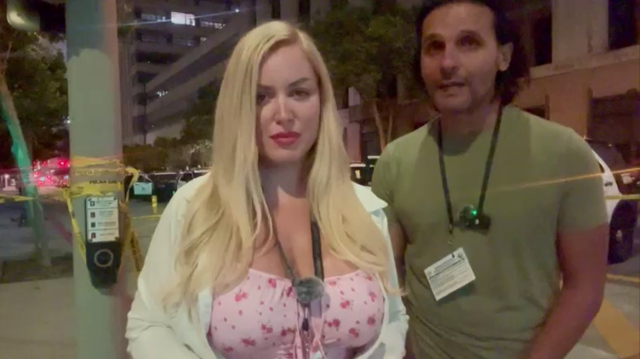“It feels like we’re in lockdown again. The streets are deserted, and the silence is overwhelming,” share Vicky Dali and Marios Lazaridis, two Greek actors residing in Los Angeles, during an interview with protothema.gr. On the evening of Thursday, June 12, they found themselves near city hall, witnessing a scene reminiscent of the pandemic’s most restrictive days: a profound stillness, desolation, and police barricades everywhere. A curfew had been enforced from 8 p.m. to 6 a.m., and all freeway exits were shut. The city appeared “frozen.”
Vicky Dali, a Greek-American with a law degree from Greece and acting training at the Strasberg Theatre & Film Institute in Los Angeles, has appeared in over 30 films. Marios Lazaridis, who graduated from the Ivana Chubbuck acting school, has spent more than a decade performing as an actor and singer in the US. Living just three kilometers from downtown, they describe a starkly different reality. “Our neighborhood, once vibrant, now feels like a desert. There’s complete silence. It’s as if time has come to a halt.”
Concerns of Greeks in Los Angeles
Immigration Crackdowns in Los Angeles
The underlying tension stems from Donald Trump’s stringent immigration policies. As the second largest city in the US and a key entry point for countless immigrants—particularly from Mexico and Latin America—Los Angeles is at the forefront of this policy change. California shares a border with Mexico, making it a hub for those seeking a better life. Among them are also Greeks navigating the residency application process, who now feel uncertain about their future.
Warnings to Students Against Traveling Outside the US
Students are experiencing heightened insecurity. Vicky and Marios explain that universities have sent written advisories stating that students should refrain from traveling abroad during the summer, due to the real risk of being denied re-entry—even with valid temporary permits. “The uncertainty is immense,” Marios states. “We’re living in a place where nothing is predictable. Every week brings new changes. Students, workers, and artists awaiting legalization are hesitant to move forward, plan vacations, or make any commitments,” he adds.
The Shift in Los Angeles: ‘It’s Not the Same Anymore’
Vicky emphasizes that the issues extend beyond legalities; they are also psychological and social. “Los Angeles used to be a city that embraced diversity, built by immigrants, offering countless opportunities. Now it appears to be losing its essence.” The transformation they describe isn’t a fleeting moment; it’s an ongoing change that has unfolded over the past five years for various reasons.
The situation began with the pandemic, leading to extended lockdowns and economic hardship. This was followed by devastating wildfires that affected many regions of California, causing destruction and prompting a broader awareness of climate threats. Now, the latest challenge is the heightened immigration tensions, resulting in increased restrictions, inspections, and a pervasive sense of social fatigue throughout neighborhoods.
“Los Angeles is no longer what it used to be. It has changed and lost its character,” Vicky reflects. “The American dream feels increasingly out of reach, and society is becoming fractured. This division is seen not just ideologically but also practically. Fear infiltrates daily life, whether in the quiet of the streets, a neighbor’s wary glance, or the concern that a simple trip to Greece could mean never returning home.”
Marios concurs. “It’s ceased being the land of opportunity. The nation seems to be grappling with its identity, and we, as immigrants, find ourselves at the heart of this existential search—this identity crisis.”
Once celebrated as a beacon of creativity, cinema, progress, and cultural coexistence, Los Angeles is now facing a profound crisis. The experiences shared by these two Greek artists illuminate a state of silent isolation, social insecurity, and pervasive police oversight, with an uncertain future looming.
Ask Me Anything
Explore Related Questions

















